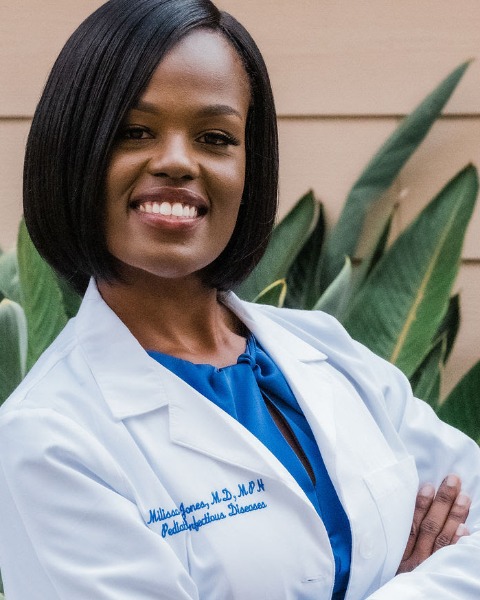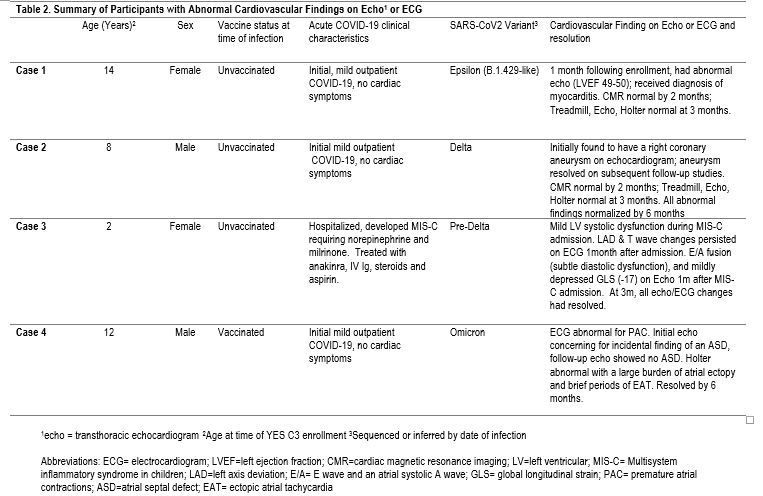Infectious Diseases
Session: Infectious Diseases 1
572 - Characteristics and Long-Term Outcomes of Cardiac Complications of SARS-CoV-2 in Youth: Results from the EPICC YES C3 Prospective Longitudinal Cohort Module
Friday, May 3, 2024
5:15 PM - 7:15 PM ET
Poster Number: 572
Publication Number: 572.419
Publication Number: 572.419

Milissa U. Jones, MD, MPH (she/her/hers)
Deputy Director
Uniformed Services University of the Health Sciences F. Edward Hebert School of Medicine
Bethesda, Maryland, United States
Presenting Author(s)
Background: Few studies have described cardiac sequela of SARS-CoV-2 infection in young persons across the spectrum of acute COVID-19 disease severity, particularly milder outpatient cases without Multisystem inflammatory syndrome in children (MIS-C).
Objective: We sought to define the frequency and long term outcomes of coronary artery aneurysms, depressed cardiac function, and other cardiac complications among youth positive for SARS-CoV-2.
Design/Methods: EPICC is a multisite, prospective, COVID-19 cohort study of Military Health System (MHS) beneficiaries. Participants eligible for the Youth Echo Screening for Cardiac Complications of COVID (YES-C3) module were SARS-CoV-2 positive, age 0-22 years and without prior history of coronary aneurysm or autoimmune disease. Participants were scheduled for echocardiography (echo) and 12 lead electrocardiogram (ECG) at enrollment and four weeks after enrollment. Those with abnormal findings had repeated echo and ECG studies at 6 and/or 12 months; clinical data were abstracted from the medical record.
Results: Between January 2021 and March 2022, 154 participants were enrolled in the YES C3 module, with median age of 10.7 years (IQR 6.4- 17.2) (Table 1). 32%, 45%, and 23% experienced their first COVID-19 infection in the pre-Delta, Delta, and Omicron era, respectively. The majority of those enrolled did not require hospitalization, with only 2 of 154 (1.3%) hospitalized, both with MIS-C. 19% of participants were fully vaccinated at the time of their infection. Among 129 participants with an echo or an ECG, 4 (3.1% (95% CI 0.09%-7.7%)) had abnormalities attributed to COVID-19 (Table 2), including 1 MIS-C case. By 6-month follow up, all echo abnormalities had resolved without intervention and no deaths were noted out to 12 months post enrollment (Figure 1).
Conclusion(s): We observed few cardiovascular complications among YES C3 participants who generally experienced mild infection, with most enrolled in the pre-vaccine and pre-Omicron era; the frequency of MIS-C and cardiac abnormalities detected may reflect tertiary medical center enrollments. All echo abnormalities resolved within 3-6 months. Our findings support current guidelines which advise against routine screening echo or ECGs for young persons with mild SARS-CoV-2 infection without cardiac symptoms. Future work should be aimed at prospectively evaluating the prevalence of cardiac abnormalities in other mild respiratory viral illnesses in order to understand if our findings are comparable to other viruses or uniquely related to SAR-CoV-2 infection.
.jpg)


